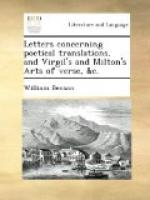“I sing the Man | who Judah’s
Sceptre bore
In that Right-hand, | which held the Crook
before;
Who from best Poet, | best of Kings did
grow:
The two chief Gifts | Heav’n could
on Man bestow.
Much Dangers first, | much Toil did he
sustain,
Whilst Saul and Hell | crost his
strong Fate in vain.
Nor did his Crown | less painful Work
afford—
Here we have seven Lines, and all of them, except the third, paus’d in the same place.
Thus I discovered from Cowley in English what I perceived from Ovid in Latin. I then turned to the Paradise Lost, and there I found Milton even surpasses Virgil in this particular. Virgil uses the common Pause at the fifth Line of the Georgicks, but Milton does not use it till he comes to the sixth Line in his Paradise Lost.
“Of Man’s first Disobedience
| and the Fruit
Of that forbidden Tree | whose mortal
Taste
Brought Death into the World | and all
our Woe,
With Loss of Eden | ’till
one greater Man
Restore us | and regain the blissful Seat,
Sing Heavenly Muse |—
It would be needless to produce more Examples to this purpose; and I believe I may venture to affirm that the Verse is varied at least with as much Skill in the Paradise Lost, as even in the Georgick itself: I am inclinable to think with more, because in this respect the English Language surpasses the Latin, by reason of its Monosyllables, of which I have said enough for any body at all versed in these Matters, to be able to make out what is here advanc’d. But before I quit this Article, I will observe that it is to the artful and uncommon varying the Pause, that the Harmony is owing in those two celebrated Lines of Sir John Denham.
“Tho’ deep | yet clear; |
tho’ gentle | yet not dull.
Strong | without Rage, | without o’erflowing
| full.
This is one of those Mysteries in Versification which the late Duke of Bucks would not suffer Mr. Dryden to communicate to the Publick. To the same Art is owing the Delicacy of two of the finest Lines in all the Latin Tongue.
“Te | dulcis conjux | te | solo
in littore | secum,
Te | veniente die | te | decedente | canebat.
Of the same Nature are many Lines in Milton, of which this is one:
“Him first | Him last | Him midst | and without End.
II. I come now to the second Particular: The Inversion of the Phrase. Every Page affords Instances of this Nature.
“—Him the Almighty Pow’r
Hurl’d headlong flaming from the
ethereal Sky.
Again,
“—Up stood the Corny
Reed
Embattell’d in her Field.—
Again,
“—Him the most High
Rapt in a balmy Cloud with winged Steeds
Did, as thou saw’st, Receive.




